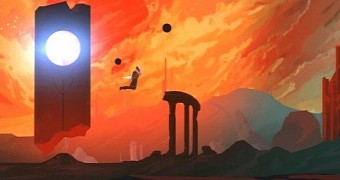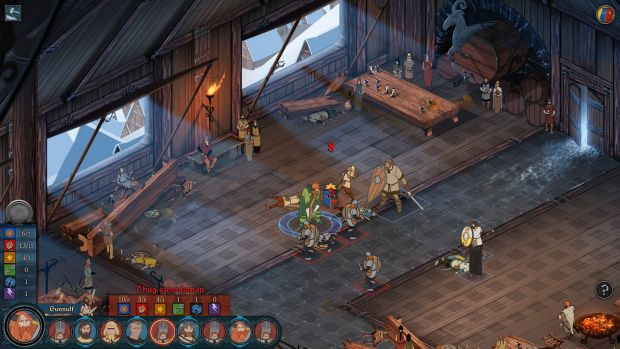As video games evolve, there are increasingly more titles that blur the lines between genres and put our own expectations on their heads, by showing us that things can be done differently and that there is still more to experience out there, aside from that which is already familiar.
That can be said about life in general, and just the way that life doesn't always create cute baby animals, but also cockroaches and venomous platypuses, so do man's creations range from beautiful to transcendent or just plain weird, as can be easily seen by viewing Escher, Dali or Bosch's creations.
In the realm of video games, people have been straying from the tested paths of arcade platformers, cover-based shooters and cutscene-laden AAA experience with stunning visuals, offering a streamlined, scripted journey, and have begun exploring other ways to interact with computers.
The first time I watched someone play Journey I was waiting for the game to start, and up until the end, I was still waiting for the action to kick in. I couldn't understand why someone would want to play a game that has no gameplay and an ambiguous story.
There is more to life than shooting
It's the same with flOw and with other such creations, using minimal controls and interaction, offering a visual journey and a different kind of experience, opening the door for non-gamers to enjoy something gamey without any prior knowledge of entrenched mechanics and expectations.
Aside from presenting people who don't yet know that fire is bad when raiding in World of Warcraft with a less challenging way to channel their predisposition to enjoy games but not adhere to strict rules such as not dying, these creations also pave the way for even more experimentation to occur, as they get coverage and are gradually discovered and accepted.
Some gamers are tired of demanding carbon copies of the titles they used to enjoy ten or twenty years ago, and they just want something different, something more relaxed, like a walking simulator.
The exploration adventure genre has seen a surge in popularity since Gone Home and Dear Esther, and many people are trying to emulate their success. The recipe is simple. No pressure, no obstacles, no boss fights, just a nice narrative to unravel and some visual stimuli.
The focus changes from dexterity to the experience in its entirety and to the feelings it manages to evoke, being less about finishing the level and more about exploration and experimentation.
Experimental games are vital to a healthy future
The latest such video game to break the rigid confines of convention is Elegy for a Dead World, a wonderful game that proposes that you write your own story instead of passively experiencing one that has already been written for you.
The game puts you in the shoes of an explorer and then sends you to three different long-deserted worlds, to explore the remains of some former civilizations and then put together the story of their existence.
Of course, the title has a pretty strong focus on the interactions between players, interactions that consist merely of publishing their own works and reading those of others and commending them. In spite of that limited array of reciprocal action, the social component of the game is integral to fully experiencing the game.
It's very rough around the edges, mainly due to the fact that it's made by a handful of people, funded through Kickstarter, but it's also a unique experience that can enrich your life and provide a serene yet challenging experience of a completely different nature than what you're used to.
The cancer of bad design
What all of these experimental games bring to the table is crucial for the long-term well-being of the gaming industry, as the successful indie devs of today will most likely be the industry drivers of ten years from now, leading much bigger teams and realizing more ambitious visions.
I hope I don't have to relay the disastrous consequences of the design by committee mantra that seems to be plaguing big-budget releases. It's perfectly understandable from the viewpoint of an investor wanting to minimize the risks, and unfortunately it also seems to be working.
Almost everyone complaining about games like Watch Dogs lacking an actual strong character, with moral fiber and a clear direction, or decrying the lack of humanity of the grizzled one-liner spewing genocide machine we're always playing as in first-person shooters, and so on, is still buying those games, even pre-ordering in some cases.
But people are starting to become fed up, and they won't press "F" to pay respects for long. People are always looking for something bold and original, something that can genuinely surprise and impress them, and the ranks of those looking for non-standard experiences are growing.
As video game consumers are a bit spoiled, they will demand something that is completely new but that feels instantly familiar at the same time, hence the publishers' reluctance to take any chances, especially considering how big development budgets are and how much time it actually takes to create something like The Elder Scrolls V: Skyrim or Wildstar, which ironically aren't your cookie cutter type of generic games to begin with.
When you get everyone in the room to share their thoughts on what they think would be awesome and then only implement the overlapping elements, you're catering to the lowest common denominator. What's next, on-screen prompts telling you to shoot your weapon at enemies?
Nobody will buy a copy of Mona Lisa made by some random unknown artist, and copying the Mona Lisa won't win anyone any popularity contests, but creativity, dedication and following a truly interesting and original vision will.
Just look at The Banner Saga or DayZ.

 14 DAY TRIAL //
14 DAY TRIAL // 





